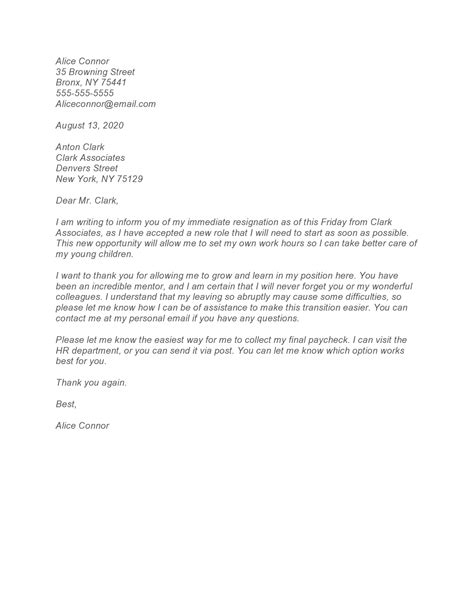Immediate Resignation Letters: Examples And Guidelines

Resigning from a job can be a difficult decision, but sometimes it’s necessary for personal or professional reasons. If you find yourself in a situation where you need to resign immediately, it’s important to do so professionally and respectfully. In this article, we’ll provide examples and guidelines for writing an immediate resignation letter.
Why Write an Immediate Resignation Letter?
An immediate resignation letter is a formal letter that informs your employer that you’re resigning from your position effective immediately. There are several reasons why you might need to write an immediate resignation letter, including:
Regardless of the reason, it’s important to handle your resignation professionally and respectfully. Here are some guidelines for writing an immediate resignation letter:
Guidelines for Writing an Immediate Resignation Letter
1. Keep it brief and to the point
Your resignation letter should be brief and to the point. State the reason for your resignation, the effective date, and express gratitude for the opportunity to work for the company.
2. Be professional and respectful
It’s important to be professional and respectful when resigning from your job. Avoid using negative language or airing grievances in your resignation letter. Keep it professional and focus on the positive aspects of your experience with the company.
3. Provide contact information
Make sure to provide your contact information in your resignation letter so that your employer can reach out to you if necessary.
4. Offer to help with the transition
If possible, offer to help with the transition process. This could include training your replacement, providing documentation, or assisting with any outstanding projects.
5. Follow up with a conversation
If possible, schedule a follow-up conversation with your employer to discuss your resignation and any outstanding issues.
Immediate Resignation Letter Example
Below is an example of an immediate resignation letter:
Dear [Manager’s Name],
I am writing to inform you that I am resigning from my position as [Job Title] effective immediately. Unfortunately, due to personal/family/health reasons, I am no longer able to fulfill my obligations to the company.
I want to express my gratitude for the opportunity to work for [Company Name]. I have enjoyed my time here and appreciate the support and guidance provided by the team.
Please let me know if there is anything I can do to assist with the transition process. I am willing to train my replacement, provide documentation, or assist with any outstanding projects.
Thank you for understanding my situation. I apologize for any inconvenience this may cause.
Sincerely,
[Your Name]
FAQs
What should I include in an immediate resignation letter?
Your resignation letter should include the reason for your resignation, the effective date, and express gratitude for the opportunity to work for the company. You should also provide your contact information and offer to help with the transition process if possible.
Is it okay to resign immediately?
Resigning immediately is not ideal, but sometimes it’s necessary for personal or professional reasons. If you need to resign immediately, make sure to handle it professionally and respectfully.
Should I speak with my employer before submitting an immediate resignation letter?
If possible, it’s a good idea to speak with your employer before submitting an immediate resignation letter. This can help to ensure a smooth transition and avoid any misunderstandings.
What if my employer is hostile or unresponsive?
If your employer is hostile or unresponsive, it’s important to still handle your resignation professionally and respectfully. Keep your resignation letter brief and to the point, and do not engage in any negative or hostile behavior.
What if I don’t feel comfortable providing my contact information?
If you don’t feel comfortable providing your contact information, you can provide alternative ways for your employer to reach out to you, such as through a personal email or phone number. However, it’s important to still provide some form of contact information to ensure a smooth transition.
Writing an immediate resignation letter can be a difficult task, but it’s important to handle it professionally and respectfully. By following these guidelines and examples, you can ensure a smooth transition and maintain a positive relationship with your employer.
